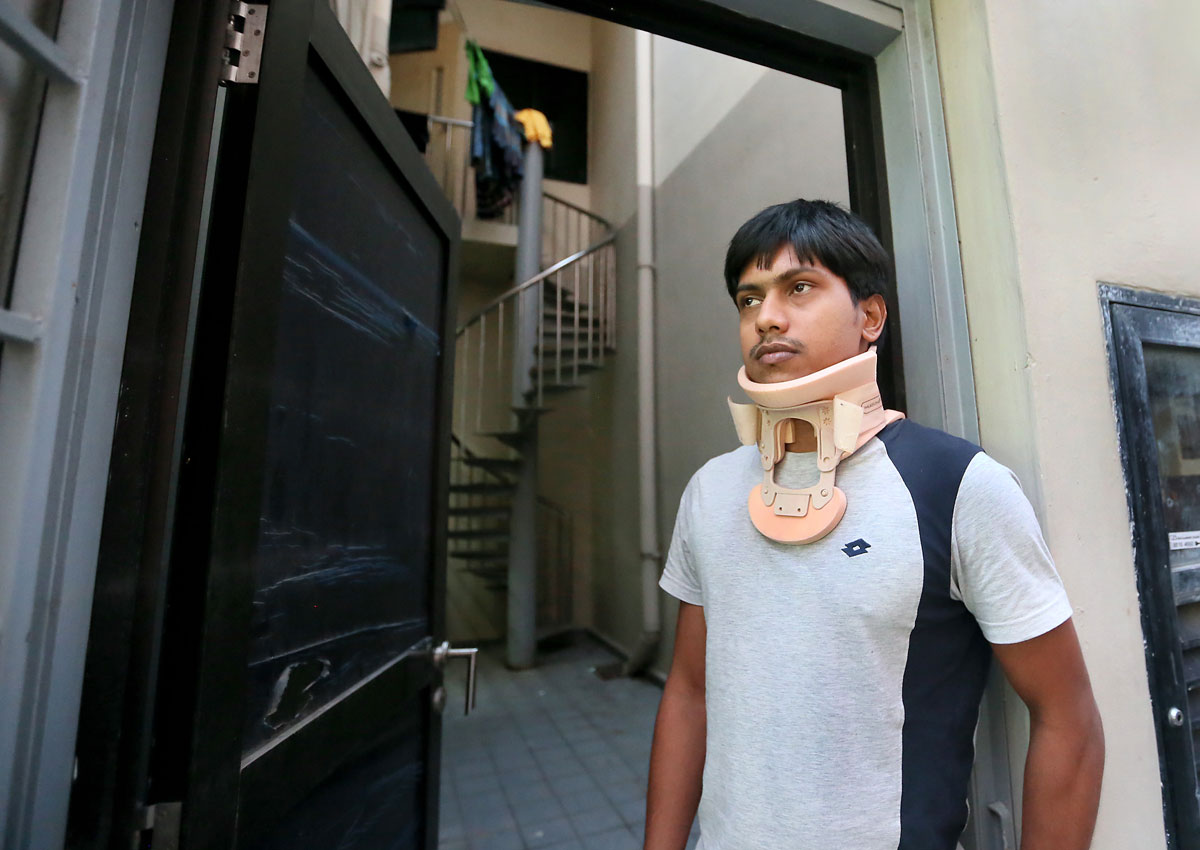They were at the airport to escort their former employee onto a flight back to Bangladesh on March 4.
But they were stopped at the airport by a volunteer from a migrant workers group, Home, who wanted to take the worker to the Ministry of Manpower (MOM) for further investigations.
Bangladeshi worker Ashraful Mohamad, 25, claimed that his employer had failed to provide medical care for his injury.
He had earlier tried to claim for work injury compensation, but this was dismissed by MOM.
His situation – which was highlighted on the Facebook page of Mr Jolovan Wham, Home’s executive director, on March 6 – drew a sympathetic response from netizens, who slammed Mr Ashraful’s employer, Ribar Industries.
The company said it had been portrayed unfairly. It made a police report at the airport.
Mr Koh Boon Hock, manager at Ribar Industries, added that they were unhappy that Mr Ashraful had an old injury, but claimed he had got injured at work.
They paid his hospitalisation bills of $33,000, but refused to pay for spinal surgery that would have cost about $40,000.
On Dec 18, three weeks into his job, Mr Ashraful claimed that he was hit by a flying metal bar at work and became unconscious.
He was warded in the National University Hospital for two months after the alleged accident. On Jan 14, he filed a Work Injury Compensation claim for a neck injury, but it was dismissed.
PRE-EXISTING CONDITION
An MOM spokesman told The New Paper that its investigations showed that Mr Ashraful had a pre-existing neck injury that was sustained in a non-work accident two years ago.
She said: “As part of the investigation, we reviewed Ashraful’s medical records, interviewed him and two witnesses he identified to obtain an account of the incident.
“Ashraful’s witnesses denied that the alleged incident on Dec 18, 2015 took place; and there was no evidence of Ashraful being hit by a steel pole as claimed.”
The MOM spokesman said it stopped Ashraful from being sent home to assist with investigations into his second claim.
The spokesman said: “Our findings, however, established that contrary to Ashraful’s allegation, the employer did provide for Ashraful’s medical treatment before he was medically certified fit for travel.”
Mr Koh said they had done their best for their worker and should not be responsible for his pre-existing injury. (see story at right.)
This is Mr Ashraful’s third time in Singapore. He will be returning to Bangladesh tomorrow.
Before arriving here, he used his life savings to pay $4,000 for agent fees and a plane ticket. He was supposed to earn about $520 a month.
Home is now trying to raise funds for Mr Ashraful’s treatment.
Employer should pay for worker’s surgery: Home
Mr Jolovan Wham, executive director of Home, feels that the employer should pay for Mr Ashraful Mohammad’s surgery, even if his injury had not been work-related.
He said: “The doctor had deemed surgery to be necessary and to be performed as soon as possible…This is not cosmetic surgery.
“He needs the surgery for a normal life.”
Employers must buy and maintain medical insurance coverage of at least $15,000 per year for each Work Permit holder, which will provide cover for causes that may not be work-related.
In response, Mr Koh Boon Hock, manager at Ribar Industries, said it had ensured that Mr Ashraful’s condition was stabilised and that he was fit for travel.
Mr Ashraful was discharged from hospital on Feb 16.
He said: “After Ashraful was discharged, we made sure that the dormitory was suitable for his stay.”
Mr Koh, who hires about 50 workers, added that the company had initially offered to pay for Mr Ashraful’s surgery to be done in Bangladesh if he was honest about the alleged accident.
Mr A.K.M. Mohsin, editor of Singapore’s only Bengali newspaper, said he is aware of a few cases of false work injury claims and these workers spoil the market for workers with legitimate claims.
Ms Debbie Fordyce from the migrant workers group Transient Workers Count Too conducted a survey that found that a majority of workplace injuries were reported by workers who have worked for less than a year and these injuries resulted in 0 to 5 per cent permanent incapacity.
She emphasised that filing claims for minor injuries should not be seen as “gaming the system”. “When caught in a disadvantaged position (where workers have no control over their salary and the employer is able to send the man home at any time), filing a claim for a small injury may seem like the only recourse to a heavily indebted worker.”
But Mr Wham said filing for a false claim is “not possible” in Mr Ashraful’s case.
He said: “He did not ask for this accident to happen. Moreover, MOM’s investigations did not reveal that it is a false claim.
“It is not a situation of Ashraful trying to take advantage of his employer. He is not even asking for any compensation now, just for medical treatment.”
Nonetheless, Mr Mohsin said he understands the employer’s hesitance to pay for the surgery, considering the worker had worked with them for only three weeks.
Ms Fordyce added that she had previously advised a worker with leukaemia to seek treatment at home as soon as he was certified fit for travel.
“It would be a rare employer who would be willing to pay for a worker’s pre-existing condition.”
linheng@sph.com.sg

This article was first published on April 4, 2016.
Get The New Paper for more stories.






